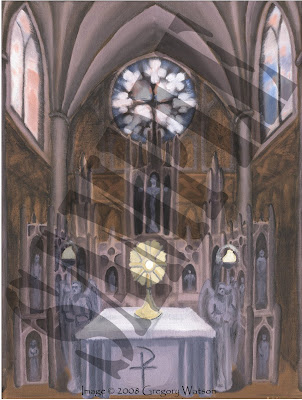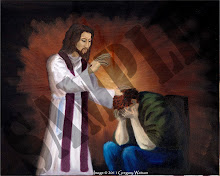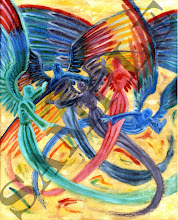I have to say, Chesterton is one of my all-time favourite authors--if not the
favourite. I thought I'd reproduce his reasons for converting to Catholicim from Anglicanism here, since it fit so well with the themes of Common Sense and knowable Truth that I discussed in Thomas vs. Thomas. Enjoy!The difficulty of explaining "why I am a Catholic" is that there are ten thousand reasons all amounting to one reason: that Catholicism is true. I could fill all my space with separate sentences each beginning with the words, "It is the only thing that..." As, for instance, (1) it is the only thing that really prevents a sin from being a secret. (2) It is the only thing in which the superior cannot be superior in the sense of supercilious. (3) It is the only thing that frees a man from the degrading slavery of being a child of his age. (4) It is the only thing that talks as if it were the truth, as if it were a real messenger refusing to tamper with a real message. (5) It is the only type of Christianity that really contains every type of man, even the respectable man. (6) It is the only large attempt to change the world from the inside, working through wills and not laws; and so on.
Or I might treat the matter personally and describe my own conversion, but I happen to have a strong feeling that this method makes the business look much smaller than it really is. Numbers of much better men have been sincerely converted to much worse religions. I would much prefer to attempt to say here of the Catholic Church precisely the things that cannot be said even of its very respectable rivals. In short, I would say chiefly of the Catholic Church that it is catholic. I would rather try to suggest that it is not only larger than me but larger than anything in the world, that it is indeed larger than the world. But since in this short space I can take only a section, I will consider it in its capacity as a guardian of the truth.
The other day a well-known writer, otherwise quite well-informed, said that the Catholic Church is always the enemy of new ideas. It probably did not occur to him that his own remark was not exactly in the nature of a new idea. It is one of the notions that Catholics have to be continually refuting, because it is such a very old idea. Indeed, those who complain that Catholicism cannot say anything new seldom think it necessary to say anything new about Catholicism. As a matter of fact, a real study of history will show it to be curiously contrary to the fact. Insofar as the ideas really are ideas, and insofar as any such ideas can be new, Catholics have continually suffered through supporting them when they were really new—when they were much too new to find any other support. The Catholic was not only first in the field but alone in the field; and there was as yet nobody to understand what he had found there.
Thus, for instance, nearly two hundred years before the Declaration of Independence and the French Revolution, in an age devoted to the pride and praise of princes, Cardinal Bellarmine and Suarez the Spaniard laid down lucidly the whole theory of real democracy. But in that age of divine right they produced only the impression of being sophistical and sanguinary Jesuits, creeping about with daggers to effect the murder of kings. So again, the Casuists of the Catholic schools said all that can really be said for the problem plays and problem novels of our own time, two hundred years before they were written. They said that there really are problems of moral conduct, but they had the misfortune to say it two hundred years too soon. In a time of tub-thumping fanaticism and free and easy vituperation, they merely got themselves called liars and shufflers for being psychologists before psychology was the fashion.
It would be easy to give any number of other examples down to the present day, and the case of ideas that are still too new to be understood. There are passages in Pope Leo’s Encyclical on Labor (
Rerum Novarum, 1891) that are only now beginning to be used as hints for social movements much newer than socialism. And when Mr. Belloc wrote about the servile state, he advanced an economic theory so original that hardly anybody has yet realized what it is. A few centuries hence, other people will probably repeat it and repeat it wrong. And then, if Catholics object, their protest will be easily explained by the well-known fact that Catholics never care for new ideas.
Nevertheless, the man who made that remark about Catholics meant something, and it is only fair to him to understand it rather more clearly than he stated it. What he meant was that, in the modern world, the Catholic Church is in fact the enemy of many influential fashions, most of which still claim to be new, though many of them are beginning to be a little stale. In other words, insofar as he meant that the Church often attacks what the world at any given moment supports, he was perfectly right. The Church does often set herself against the fashion of this world that passes away, and she has experience enough to know how very rapidly it does pass away. But to understand exactly what is involved, it is necessary to take a rather larger view and consider the ultimate nature of the ideas in question—to consider, so to speak, the idea of the idea.
Nine out of ten of what we call new ideas are simply old mistakes. The Catholic Church has for one of her chief duties that of preventing people from making those old mistakes, from making them over and over again forever, as people always do if they are left to themselves. The truth about the Catholic attitude toward heresy -- or, as some would say, toward liberty -- can best be expressed perhaps by the metaphor of a map. The Catholic Church carries a sort of map of the mind that looks like the map of a maze but is in fact a guide to the maze. It has been compiled from knowledge that, even considered as human knowledge, is quite without any human parallel.
There is no other case of one continuous, intelligent institution that has been thinking about thinking for two thousand years. Its experience naturally covers nearly all experiences and especially nearly all errors. The result is a map in which all the blind alleys and bad roads are clearly marked, all the ways that have been shown to be worthless by the best of all evidence: the evidence of those who have gone down them.
On this map of the mind the errors are marked as exceptions. The greater part of it consists of playgrounds and happy hunting-fields where the mind may have as much liberty as it likes, not to mention any number of intellectual battlefields in which the battle is indefinitely open and undecided. But it does definitely take the responsibility of marking certain roads as leading nowhere or leading to destruction, to a blank wall, or to a sheer precipice. By this means it does prevent men from wasting their time or losing their lives upon paths that have been found futile or disastrous again and again in the past but might otherwise entrap travelers again and again in the future. The Church does make itself responsible for warning its people against these, and upon these the real issue of the case depends. It does dogmatically defend humanity from its worst foes: those hoary and horrible and devouring monsters of the old mistakes.
Now, all these false issues have a way of looking quite fresh, especially to a fresh generation. Their first statement always sounds harmless and plausible. I will give only two examples. It sounds harmless to say, as most modern people have said, "Actions are wrong only if they are bad for society." Follow it out, and sooner or later you will have the inhumanity of a hive or a heathen city establishing slavery as the cheapest and most certain means of production, torturing the slaves for evidence because the individual is nothing to the state, declaring that an innocent man must die for the people, as did the murderers of Christ. Then, perhaps, you will go back to Catholic definitions and find that the Church, while it also says it is our duty to work for society, says other things also that forbid individual injustice.
Or again, it sounds quite pious to say, "Our moral conflict should end with a victory of the spiritual over the material." Follow it out, and you may end in the madness of the Manicheans, saying that a suicide is good because it is a sacrifice, that a sexual perversion is good because it produces no life, that the devil made the sun and moon because they are material. Then you may begin to guess why Catholicism insists that there are evil spirits as well as good and that materials also may be sacred, as in the Incarnation or the Mass, in the sacrament of marriage or the resurrection of the body.
There is no other corporate mind in the world that is thus on the watch to prevent minds from going wrong. The policeman comes too late when he tries to prevent men from going wrong. The doctor comes too late, for he comes only to lock up a madman, not to advise a sane man on how not to go mad. And all other sects and schools are inadequate for the purpose. This is not because each of them may not contain a truth, but precisely because each of them does contain a truth and is content to contain a truth. None of the others really pretends to contain the truth. None of the others, that is, really pretends to be looking out in all directions at once.
The Church is not armed against merely the heresies of the past, or even of the present, but equally against those of the future that may be the exact opposite of those of the present. Catholicism is not ritualism; it may in the future be fighting some sort of superstitious and idolatrous exaggeration of ritual. Catholicism is not asceticism; it has again and again in the past repressed fanatical and cruel exaggerations of asceticism. Catholicism is not mere mysticism; it is even now defending human reason against the mere mysticism of the pragmatists.
Thus, when the world went Puritan in the seventeenth century, the Church was charged with pushing charity to the point of sophistry, with making everything easy with the laxity of the confessional. Now that the world is not going Puritan but pagan, it is the Church that is everywhere protesting against a pagan laxity in dress or manners. It is doing what the Puritans wanted done when it is really wanted. In all probability, all that is best in Protestantism will survive only in Catholicism, and in that sense all Catholics will still be Puritans when all Puritans are pagans.
Thus, for instance, Catholicism, in a sense little understood, stands outside a quarrel like that of Darwinism at Dayton. It stands outside it because it stands all around it, as a house stands all around two incongruous pieces of furniture. It is no sectarian boast to say it is before and after and beyond all these things in all directions. It is impartial in a fight between the Fundamentalist and the theory of the origin of species because it goes back to an Origin before that origin, because it is more fundamental than Fundamentalism. It knows where the Bible came from. It also knows where most of the theories of evolution go to. It knows there were many other gospels besides the four Gospels and that the others were eliminated only by the authority of the Catholic Church. It knows there are many other evolutionary theories besides the Darwinian theory and that the latter is quite likely to be eliminated by later science. It does not, in the conventional phrase, accept the conclusions of science, for the simple reason that science has not concluded. To conclude is to shut up, and the man of science is not at all likely to shut up.
It does not, in the conventional phrase, believe what the Bible says, for the simple reason that the Bible does not say anything. You cannot put a book in the witness box and ask it what it really means. The Fundamentalist controversy itself destroys Fundamentalism. The Bible by itself cannot be a basis of agreement when it is a cause of disagreement; it cannot be the common ground of Christians when some take it allegorically and some literally. The Catholic refers it to something that can say something, to the living, consistent, and continuous mind of which I have spoken: the highest mind of man guided by God.
Every moment increases for us the moral necessity for such an immortal mind. We must have something that will hold the four corners of the world still while we make our social experiments or build our utopias. For instance, we must have a final agreement, if only on the truism of human brotherhood, that will resist some reaction of human brutality. Nothing is more likely just now than that the corruption of representative government will lead to the rich breaking loose altogether and trampling on all the traditions of equality with mere pagan pride.
We must have the truisms everywhere recognized as true. We must prevent mere reaction and the dreary repetition of the old mistakes. We must make the intellectual world safe for democracy. But in the conditions of modern mental anarchy, neither that nor any other ideal is safe. Just as Protestants appealed from priests to the Bible and did not realize that the Bible also could be questioned, so republicans appealed from kings to the people and did not realize that the people also could be defied.
There is no end to the dissolution of ideas, the destruction of all tests of truth, that has become possible since men abandoned the attempt to keep a central and civilized Truth, to contain all truths and trace out and refute all errors. Since then, each group has taken one truth at a time and spent the time in turning it into a falsehood. We have had nothing but movements, or, in other words, mono-manias. But the Church is not a movement but a meeting place, the trysting-place of all the truths in the world.
-- Gilbert Keith Chesterton (1874–1936).








